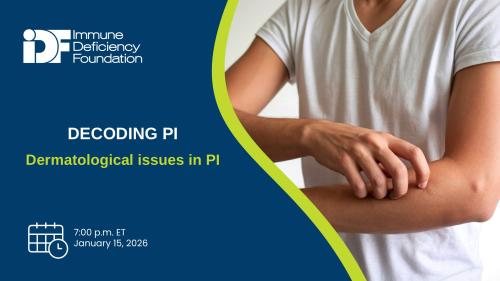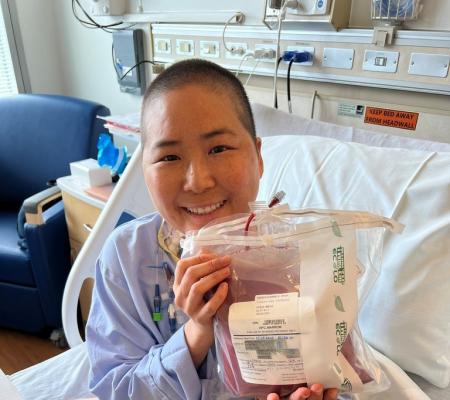
-
Understanding primary immunodeficiency (PI)

Understanding PI
The more you understand about primary immunodeficiency (PI), the better you can live with the disease or support others in your life with PI. Learn more about PI, including the various diagnoses and treatment options.
-
Living with PI
-
Addressing mental health
-
Explaining your diagnosis
- General care
- Get support
- For parents and guardians
-
Managing workplace issues
- Navigating insurance
-
Traveling safely

Living with PI
Living with primary immunodeficiency (PI) can be challenging, but you’re not alone—many people with PI lead full and active lives. With the right support and resources, you can, too.
-
Addressing mental health
-
Get involved

Get involved
Be a hero for those with PI. Change lives by promoting primary immunodeficiency (PI) awareness and taking action in your community through advocacy, donating, volunteering, or fundraising.
-
Advancing research and clinical care
-
Research Grant Program
-
Consulting immunologist
-
Diagnosing PI
-
Getting prior authorization
-
Clinician education
-
Survey research
-
Participating in clinical trials

Advancing research and clinical care
Whether you’re a clinician, researcher, or an individual with primary immunodeficiency (PI), IDF has resources to help you advance the field. Get details on surveys, grants, and clinical trials.
-
Research Grant Program
Primary immunodeficiency (PI) can cause rare liver disease so a visit to the hepatologist, or liver specialist, can provide peace of mind that your liver is functioning well or critical information you can use to monitor or treat liver disease.
“When should you see a hepatologist? Sooner rather than later because there are things we can do. We can't cure. Cure is a four-letter word in hepatology we don't like to use. But we can really help. Help is a word that we like to use,” said Dr. Theo Heller, chief of translational hepatology at the National Institute of Health (NIH) who presented on PI and hepatology at the 2024 PI Conference.
“Liver expertise matters for the liver. So having someone who understands liver disease, who knows about liver disease, who can think about it in the context of PI will understand the road less traveled, the less common things, and the presentations that are a little bit different.”
Considered part of the gastrointestinal tract, the liver is the second largest organ in your body, after the skin, and weighs 1.5-2% of your body weight. It’s located next to the stomach, above the colon, and is protected by the ribs. Blood is filtered through the spleen, an avocado-sized organ important for immune function, then flows through the liver, and then back to the heart.
As part of the filtering process, the liver breaks down toxins such as those in medicines; controls metabolism, or the body’s use of proteins, fats, and glucose; stores vitamins, and protects the body overall.
Although studies examining PI and liver disease broadly are lacking, some studies indicate liver disease occurs in at least 10% of those with common variable immune deficiency (CVID), and 25% of children with PI. Contributors to liver damage in persons with PI include infection, immune dysregulation, cancer, clumps of white blood cells, inflammatory cells, and blockage in the biliary system.
“Liver involvement may be more common than we think, but the good news is that in my experience it's generally mild. For most people, it's there but it doesn't progress,” said Heller.
A common liver disease is cirrhosis, which is permanent scarring of the liver. When a person has cirrhosis, their liver does not function and the liver develops high blood pressure, or portal hypertension.
While persons with PI can develop cirrhosis, they are also at risk for liver disease that is less common, particularly nodular regenerative hyperplasia (NRH), resulting in non-cirrhotic portal hypertension (NCPH), also known as porto-sinusoidal vascular disease. Porto-sinusoidal vascular disease is when the small vessels in the liver get damaged without scarring. It causes extremely high blood pressure in the liver, but it’s not cirrhosis, explained Heller.
“It's often silent, but silent does not equate to safe,” said Heller. “This concept of noncirrhotic portal hypertension is very important because doctors normally say, ‘Oh your albumin's fine, your bilirubin is fine, your prothrombin time is fine, your liver is working fine, you don't have liver damage. I don't care that your enzymes are elevated.’
“But you have noncirrhotic portal hypertension, you have nodular regenerative hypoplasia, or you have something else that is as significant as cirrhosis. This is silent in terms of function being normal and is more common in PI.”
Persons with PI should visit a hepatologist for a liver screening. If you have CVID, screening is especially important because liver disease associated with CVID is unrecognized and underreported. Those diagnosed with liver disease should be seen regularly, depending on the severity of the disease.
Diagnosing liver disease in PI requires piecing together the results of multiple medical assessments.
“There's not a perfect test that you can do for liver disease. Often, we rely on combinations of tests. We have to look at the numbers and trends over time and put it together,” said Heller.
“Liver biopsy is incredibly important. Liver biopsy makes such a difference for patients with PI because the liver disease is often different. We've moved away from liver biopsies in general for hepatitis C and for hepatitis B… but for some diseases, we really depend on it and this is one of those cases. We don't have to do lots of liver biopsies but at least one.
“Also, you get your blood tests. You get the liver enzymes measured, the platelets measured, the liver function test measured, and you get imaging. I can't tell you how important imaging is. A good MRI or a good CAT scan makes a big difference.”
Patients with chronic liver disease can feel alone, overwhelmed, and not understood, said Heller. The antidote to uncertainty is to keep medical appointments, educate yourself, and create a network of support with family, friends, and healthcare providers.
“Find healthcare providers who will learn with you. You want someone available and accessible. You want to build trust. You need trust because, in times of crisis, you need to know you can call them. You need a center of excellence. If you live in Nebraska, you're not going to have the world authority on chronic granulomatous disease (CGD), but you need a doctor there who's excellent in the sense of caring and who's excellent in the sense that they're there for you and they'll respond to you and that they can access care elsewhere,” said Heller.
“And it’s really important to go out and to live, to spend time with others that matter to us because the diseases don’t define you.”
Watch 2024 PI Conference sessions
Missed a session or want a refresher? 2024 PI Conference session recordings are now available!
Browse sessionsTopics
Related resources
Sign up for updates from IDF
Receive news and helpful resources to your cell phone or inbox. You can change or cancel your subscription at any time.





The Immune Deficiency Foundation improves the diagnosis, treatment, and quality of life for every person affected by primary immunodeficiency.
We foster a community that is connected, engaged, and empowered through advocacy, education, and research.
Combined Charity Campaign | CFC# 66309




